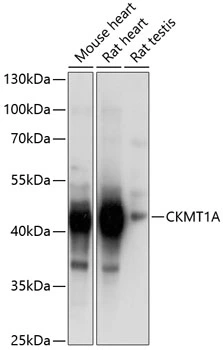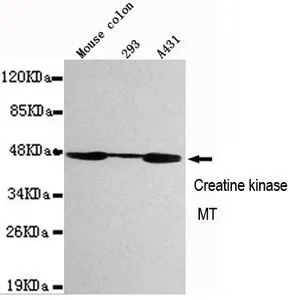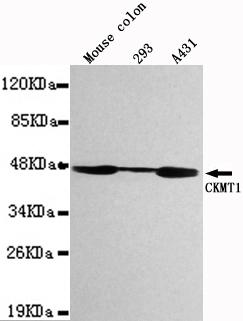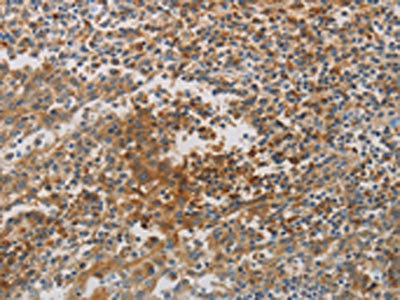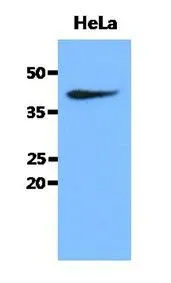
WB analysis of HeLa lysate (40ug) using CKMT1A antibody at a dilution of 1:1,000.
Creatine kinase MT antibody [AT17A2]
GTX53700
ApplicationsWestern Blot, ELISA
Product group Antibodies
ReactivityHuman
TargetCKMT1B
Overview
- SupplierGeneTex
- Product NameCreatine kinase MT antibody [AT17A2]
- Delivery Days Customer9
- Application Supplier NoteThe antibody has been tested by ELISA, Western blot analysis to assure specificity and reactivity. Since application varies, however, each investigation should be titrated by the reagent to obtain optimal results. Recommended starting dilution is 1:1000.
- ApplicationsWestern Blot, ELISA
- CertificationResearch Use Only
- ClonalityMonoclonal
- Clone IDAT17A2
- Concentration1 mg/ml
- ConjugateUnconjugated
- Gene ID1159
- Target nameCKMT1B
- Target descriptioncreatine kinase, mitochondrial 1B
- Target synonymsCKMT, CKMT1, UMTCK, creatine kinase U-type, mitochondrial, U-MtCK, acidic-type mitochondrial creatine kinase, creatine kinase, mitochondrial 1 (ubiquitous), mia-CK, ubiquitous mitochondrial creatine kinase
- HostMouse
- IsotypeIgG2b
- Protein IDP12532
- Protein NameCreatine kinase U-type, mitochondrial
- Scientific DescriptionMitochondrial creatine (MtCK) kinase is responsible for the transfer of high energy phosphate from mitochondria to the cytosolic carrier, creatine. It belongs to the creatine kinase isoenzyme family. It exists as two isoenzymes, sarcomeric MtCK and ubiquitous MtCK, encoded by separate genes. Mitochondrial creatine kinase occurs in two different oligomeric forms: dimers and octamers, in contrast to the exclusively dimeric cytosolic creatine kinase isoenzymes. Many malignant cancers with poor prognosis have shown overexpression of ubiquitous mitochondrial creatine kinase; this may be related to high energy turnover and failure to eliminate cancer cells via apoptosis. Ubiquitous mitochondrial creatine kinase has 80% homology with the coding exons of sarcomeric mitochondrial creatine kinase. Two genes located near each other on chromosome 15 have been identified which encode identical mitochondrial creatine kinase proteins. [provided by RefSeq, Jul 2008]
- ReactivityHuman
- Storage Instruction-20°C or -80°C,2°C to 8°C
- UNSPSC12352203

